Titus Played the Fool: July 17, 2006 Subpoena Hearing Transcribed
Judge: Mr. Manning I believe you were the first to file.
Former District Attorney Mike Nifong: If I might just say something briefly about the posture here. In this case, which is the Finnerty, Evans and Seligmann case, the State filed a subpoena with Duke University for certain records of the members of the team that were not indicted in this case. Specifically, we requested the home addresses of the players and we also requested the card access for the 13th and 14th of March which are the 2 days that bookend the time of the incident that took place in the vicinity of midnight on the 13th into the morning of the 14th. As the court is aware, under FERPA, the Family Educational Right to Privacy Act, if the State chooses to get a court order to provide such information sealed, the university is not allowed to disclose the fact that the order has been requested and has to provide the information pursuant to that order. Because the nature of this information, however, was not something that was subjected to that, the State issued a subpoena, a regular subpoena, which requires that the university notify each of the attorneys to give them an opportunity to object to the issuance of that subpoena and the release of that information and we’re here pursuant to those motions. I just wanted to state that for the record.
Judge: Thank you sir. Mr. Manning you wish to be heard?
Tommy Manning: Thank you your Honor. Does your Honor have movant Fred Krom, Jr.’s motion?
Judge: It's in one of these 3 files. I have reviewed it but I’d be happy to have that
Manning: Your Honor, I represent Fred Krom, Jr., movant, and he’s the only person who I represent in this matter. Your Honor in our motion to quash I went immediately to the merits of FERPA and did not address the initial facial invalidity of the subpoenas and I would ask the court’s indulgence if you could examine attachment 1. There’s subpoena #1 and subpoena #2 that are attached to my motion. Your Honor, I really feel that the court should, after examining the subpoena #1 which is, I just designated it as #1 because it was the first one that I came to, addressed to the university registrar. The subpoena, I believe, is void on its face as a procedural matter without making any reference to the substance of our motion. The return of the subpoena, your Honor, is
Judge: Mr. Nifong?
Nifong: As far as I know, there’s only one side to those subpoenas they got.
Manning: I’ll accept that, your Honor, the subpoena being one-sided ..
Nifong: It is a two page …garble… one side
Manning: …two page subpoena but didn’t mean it in terms of any bias (?) … just that its got one side. The subpoena does not contain any provisions similar to the commands of Rule 45 or the AOC form for subpoenas, and subpoenas duces tecum regarding the advise of rights of the person subpoenaed to challenge the subpoenas. The university’s counsel’s office at Duke was heads up enough, your Honor, to comply with the provisions of FERPA and informing Mr. Krom of the existence of the subpoena. No copy of the subpoena was, nor is it required to, was sent to my office by the DA’s office although I have sent prosecution counsel a representation letter some time before the issuance of the subpoena.
Your Honor, on its face the subpoena does not comply with the provisions of Rule 45 and as a practical matter should be quashed. At this point without reaching the merits of the contents of the records, which it seeks to have produced. I could make the same argument with respect to subpoena #2, which is identical in form, your Honor, except for the material, which is requested on the face of the subpoena.
Judge: Is that all sir?
Manning: At this point, that’s my argument for now if the court differs with my analysis of the face of the subpoena then I’d like to be heard further.
Judge: I want each of you to make all the arguments that you wish to make with respect to the subpoena so that I can allow Mr. Nifong to respond and you all to respond to his response and then I can consider all of your comments with respect to the motion to quash.
Manning: Thank you, your Honor, I’ll continue then. With respect to Fred Krom, Jr., your Honor, we contend for the reasons stated in our motion that the subpoena does not comply with the provisions of FERPA and the Code of Federal Regulations csited in our motion and also alluded to on the face of the subpoena itself. Your Honor the reasons for the issuance of the subpoena are not stated, there is no basis, there was no motion filed requesting the court to issue either a subpoena or an order, there is no showing of materiality, there is no showing of any kind from the face of the subpoena which would indicate that the records of Fred Krom, Jr. should be produced with respect to the pending actions against Mr. Finnerty, Mr. Seligmann or Mr. Evans.
The subpoenas, both of them, are devoid of any material, which would indicate that the material requested, should be requested, on their face. In addition, your Honor, as stated in our motion, prosecution counsel has disclosed to me on two occasions during, excuse me three occasions, during the pendency of the investigation, preceding the indictment, of Mr. Finnerty, Mr. Seligmann and Mr. Evans, information which is pertinent to your Honor’s decision should your Honor even reach the merits past the facial invalidity challenge to the subpoena.
First, your Honor, the DA’s office commissioned and authorized a photo identification proceeding sometime early in the investigation and had the complaining witness seated somewhere in the DPD where she was shown photographs of every member of the Duke LAX team, on some type of projection. And was shown each photograph for at least one full minute and then the alleged victim was asked whether or not she knew of the person whose image appeared on the screen and, if so, what if anything she had to say about that person. With respect to Mr. Krom, your Honor, and I’m not passing any judgment or taking any position with respect to the legality or constitutionality of that photographic array, that photographic identification procedure but, after being shown a picture of Mr. Krom, your Honor, the AV said in response to a question by a sergeant, “Do you recognize him?” and the AV responded, “No”. And, I’ll hand this up (transcript of photo array) again in my argument it contains the entire description of the identification procedure.
Second matter, your Honor, the prosecution counsel commissioned, initially, DNA analysis be done as to DNA samples submitted by all of the members of the Duke LAX team including my client Mr. Krom. The SBI lab conducted an initial evaluation and as to Mr. Krom, there was no positive result, nothing in the SBI report which tended to indicate Mr. Krom’s DNA was present in any of the samples submitted for evaluation to the SBI.
Thirdly, your Honor, following the SBI DNA analysis, apparently prosecution counsel commissioned yet a second DNA comparison. Where the DNA samples were resubmitted to a private laboratory of some kind and when those results were returned, again, as it relates to Fred Krom, Jr., your Honor, those results were in the negative as to any DNA linkage.
And so, going into, your Honor, the issuance of the subpoena to the registrar’s office which contained a command to produce Mr. Krom Jr.’s university records and his home address with respect to whether there’s any showing, which would support even an ex parte or a motion filed and replied to by me as Mr. Krom Jr.’s lawyer requesting a court order or some other process be issued for Mr. Krom’s home address or his private information coming from Duke University. There is an absolute absence of information that the State can produce which links him to any of the matters, your Honor, which are pending before the court in State v. Finnerty, Seligmann or Evans.
That brings me then to not a, it’s a term of art, your Honor, not a criticism in any way of the DA’s procedure in investigating his case but in the absence of the SBI DNA, and the absence of a more sophisticated DNA analysis and in the stark fact that the AV in this matter did not identify Mr. Krom in any way, shape, fashion or form when presented with his picture in a photo identification proceeding. What basis can there be for the State to then seek to bring into its purview the private information of Mr. Krom and his family? There has to be a nexus, there has to be some connection other than curiosity or ‘I just want to see it’ in order to have a court issue an order which would invade the privacy which is protected by various levels of Federal law. In Mr. Krom’s situation, your Honor, and he is not the only one of the students, but I’m not their lawyer, with whom there’s no photographic identification connection with this case. As to him, for the reasons in our motion and to the facial invalidity to the two subpoenas themselves, we’d move the court to quash the subpoenas as it relates to Fred Krom, Jr.
Your Honor, the second subpoena deals with asking for his home address. Yet another invasion of his family’s privacy and his as well. In the absence of any nexus connecting him to these alleged crimes. The fact that he may have been a member of the LAX team, standing alone, does not provide any basis for seeking the information that the State requests. And, on behalf of Mr. Krom Jr., I would move to quash both subpoena #1 and subpoena #2 as it relates to him.
Judge: Alright. Mr. Thomas?
Bill Thomas: Thank you very much your Honor. Your Honor, I represent Mr. Bruce Thompson. Has the court seen/have my motion to quash? Your Honor, likewise in all these cases there were two subpoenas issued. One to the registrar seeking the home address of Mr. Thompson, the other one to the Director of Auxiliary Services seeking information with respect to a Duke access card and asking for that for a period of about 24 hours on March 13th through March 14th this year. There’s no question that the information that the DA is attempting to subpoena is covered by FERPA, its educational information, its educational records, and they’re clearly covered.
The reason for FERPA is two-fold, the first is to give students access to their records but the second most important reason that applies here is to ensure the privacy and confidentiality of his records. There are some exceptions that apply and in the regulations one exception is a court order or a lawfully issued subpoena. Your Honor, I think in this case that we do not have a lawfully issued subpoena because the subpoena in issue is facially invalid. Mr. Manning very aptly stated the application of Rule 45 (c) where you have to have information with respect to the rights of information being subpoenaed, the right to object, the time period for objecting attached to the subpoena. The AOC form actually has it printed on the reverse side of a subpoena and the subpoena that was issued in this case appears to be a hand-drafted subpoena that lacks any of the information required by Rule 45 (c).
But, more importantly, this subpoena has very interesting language in it that I ask the court to note. It says to both the Registrar and to the Director of Auxiliary Services that they are “commanded to appear and testify in the above entitled action before the Court at the place, date and time indicated below”. And, then it says, with respect to the one for Mr. Cunningham, “produce for the court the following items at the time and place, date indicated below pursuant to 34CFR Part 99.31 FERPA. The home address for each Duke University student listed on the attached list.” And, there are a total of 49 students listed there. The language, with respect to the Director of Auxiliary Services, is identical except that it contains the provision that he is to provide, he’s also to appear and testify, the key card access used by the attached list of Duke University students from 8am March 13th 2006 to 8am March 14th 2006. Again, both of these subpoenas are returnable to the Security Court Judge’s chambers. Your Honor, I have examined the files and I do not see an underlying court order authorizing this procedure. The RPCs are very clear that you cannot issue a trial subpoena, that is, this is a trial subpoena or a hearing subpoena and have it delivered to an office. Now the argument can be made ‘Well it wasn’t delivered to the DA’s office it was delivered to the Superior Court Judge’s office”. But, your Honor, the procedure has been tainted by delivery to an office and you can’t cleanse an otherwise tainted procedure by saying “Oh, I’m going to have it delivered to the Judge’s office and then go over and pick it up there.” The Rules don’t work like that. RPC 236, opinion #3 deals specifically with an attorney seeking medical and bank records and subpoenaing those records to his office and the RPC is very clear that that is an improper procedure. And, that is exactly what the court has here except instead of having it delivered to the office of the DA its delivered to the Judge’s chambers where I’m assuming it would then be retrieved and taken back to the DA’s office and that does not cleanse an otherwise tainted procedure in any way, form or fashion.
Judge, you may recall, and I’m sure you do, that this is not the first time that we’ve had problems with subpoenas in this county. I’ll site to the court the case of Collins v. Hardin we had the identical issues with information being subpoenaed with subpoena duces tecum with the issuance of trial subpoenas to have witnesses appear in the DA’s office or have information delivered to the DA’s office where there is no hearing scheduled, no motion hearing, no trial hearing, only to receive the information. This is clearly an improper procedure.
There was a consent order, which I attached to the back of my motion; I believe it may be the final exhibit. Exhibit #2, which was a consent order signed by Superior Court Judge Leon Stanback as well as a representative from the AG’s office as well as the lawyers who were representing the plaintiffs in the action and I direct the court to the agreement paragraph 3 where it was agreed “a party shall not use a trial subpoena as defined by law to compel the production of documents to any office of a party.” Well, if the argument is made that it wasn’t to the office of the DA but it was to the Superior Court Judge’s chamber without any judicial oversight that does not help that process at all. Its infirm and it stays infirm as long as there’s no judicial official weighing what to release and when to release it. Judge there’s two cases that I’ve cited that I think are very dispositive here; the Enray(?) Superior Court Order and DTH Publishing v. UNC. The DTH Publishing case is very interesting in that it actually holds the education records under FERPA confidential and they’re privileged. The case squarely holds on both counts that they’re confidential and they’re privileged. Enray (?) Superior Court Order dealt with bank records and its very clear in that case that the applicant, the DA, had to make a showing before the court before they were authorized to obtain these records and certainly education records are more closely guarded than bank records. Your Honor, the reason for that is, a judge, a judicial official is in that unique position to carefully weigh the very important confidential records, the right to keep them private versus the need of the State to obtain those records. Only the Court is in that unique position. And that’s why this procedure requires an application to the court to get these records. The Court must carefully weigh the important privacy interests of Mr. Thompson versus whatever showing the State may make with respect to the need for these records.
Rule 45 and the cases under it, I’ve cited State v Newell but, the use of the subpoena duces tecum as a discovery tool has been expressly rejected by our courts. And, clearly this is what is going on in this case. This is clearly a discovery tool. It is seeking information by the use of a subpoena duces tecum without a hearing being scheduled….
*****25:12 audio interference….. Thomas continues requesting a protective order if records are to be released….
at 24:04 Atty Williams is now up----
Butch Williams: …in the interest of justice I’m not going to prolong or go back through the arguments that have previously been made. I’m pretty sure you got a handle both on Rule 45 and on FERPA. I mean it’s a tough act to follow. But I will say Judge…. interference 20 seconds…. and I will also echo what Mr. Thomas just said relative to why FERPA is the way that it is and the total expectation of privacy that is in there. It’s there for a number of reasons dissemination of private information but, your Honor, this case presents a particular challenge in regards to the releasing of information due to the vast amounts of publicity that has been garnered by this case. Some of these students are mighty particular and I didn’t say it at the outset but I stand and represent Daniel Flannery. Some who had left the area and gone on to other parts of the country and somehow names addresses and things like that have come up both on the internet as well as television things of that, along with pictures. What we don’t know is the number of people who have been following this case all across the country and if somehow this information was released and somehow this information got out, addresses and local surroundings, contrary to FERPA, it would create, one it is violating their privacy as well as it may in fact create a detrimental situation. There have in fact
The other thing I’ll say Judge is that there are other ways to get that particular information I mean this is not the only case that is in Durham county, its not the only case where the DA has had to use witnesses in who he knows has attorneys that are representing folks. Its not uncustomary to just pick up the phone and call a lawyer if you’re seeking to have them come in as a witness or some other form as opposed to going and getting their personal data and information. At some point in time there may be a call for a spirit of cooperation in that particular regard but at this time, Judge, I’m going to have to vehemently object to the subpoena and I’m only listed for one, because my client didn’t have a swipe card so I’m not really interested for my purposes in that but in terms of releasing his home address or any of his other identifying information for this purpose, I vehemently object and its noted in my motion. Thank you.
Judge: Mr. Ekstrand
Bob Ekstrand: Thank you, your Honor. I won’t repeat I certainly adopt what my collegues have said. I would like to emphasize however that FERPA establishes a congressional conclusion that the privacy rights that are attached to things like medical records and other personal information like banking records would also apply to educational records. As such, what happens in a case like this when somebody is approaching the court with an order compelling the disclosure of private, federally protected information that the individual that’s seeking production must show the court some need, some individualized, particularized need for those records. In addition that individual needs to show the court that that need overrides that federal conclusion that these records are important and the confidentiality is important. It must be preserved, not at all costs, but it must be preserved diligently against assertions of need that are not sufficient to override it. Essentially, this question asks this court to balance the need of the requesting party with the established privacy rights of the individuals, the students involved here and this court has no way of doing that today because the court does not have the fundamental tool that is used to articulate the need. There’s no affidavit and our courts have said long before FERPA and even outside of the scope of FERPA and in cases you have before you entering superior court order is a leading case, that there must be an affidavit or similar evidence and by that I take the court to mean similarly sufficient and certainly sworn testimony of some kind. A witness, under oath would do but, it seems the proper vehicle is an affidavit and its clear, obviously, there is no affidavit here. And, as such, this court has no way of balancing the State’s need against the established privacy interests. How could it? It simply doesn’t know what that need is.
I would abstain from getting into the issue of how that balancing test should work out obviously that is an art, it is the Judge’s art and we would leave it to you. But we certainly would hope that we would have an affidavit that articulates the need so that we may evaluate it and offer evidence in support of our position. But at this point, we simply do not know what that articulated need is and it is certainly not our burden to prove that the State does not need it and we don’t want to fall into that trap here. The courts are very clear that the movant bears the burden of proving that the need outweighs that interest. And, I’ll just leave it at that your Honor.
Judge: Mr. Mack
Julian Mack: Yes sir. The good thing about going last is that there’s really not a whole lot more to say. So at this time, since all my lovely colleagues have said everything that I would have said, on behalf of my clients, Mr. Jennison and Mr. Wellington at this time I’d move to quash the subpoenas as they relate to those people(?).
Thomas: Your Honor, may I hand out copies of the Enray (?) Superior Court Order dated April 8th, 1983 and the DTH v. UNC cases?
Judge: Yes, sir.
Thomas: I’ll hand Mr. Nifong a copy.
Judge: Mr. Nifong do you wish to respond?
Nifong: Yes your Honor, thank you. Your Honor, let me apologize in advance for my voice. I’ve been suffering from a respiratory infection and it’s a little weak.
First it’s important not to forget what FERPA exists for. If all you heard is what we’ve heard so far today you’d think that FERPA was passed to protect students from inquiries by courts into things that they’re wanting to keep secret. FERPA is an act that was designed to set up conditions for the availability of public federal funds to educational agencies and institutions. That’s why it exists. What it says is, if you want our money then these are the things you must comply with in order to get that. We’ve put these protections in for any institution that wants federal money. Don’t want Federal money, don’t have to comply with FERPA. So, its important to recognize that from the outset that the purpose of FERPA is not at all directed to the issues in this particular case. That having been said, within FERPA and specifically within Part 99 of the Code of Federal Regulations Title 34, Volume 1, it is specified there are 15 exceptions to FERPA dealing with just a disclosure requirement or the notice requirement in other words not with whether the institution can actually release this information but whether or not it must give notice to the parties in the case of persons over the age of 18 years, or the students themselves of their rights under FERPA. And, one of the exceptions, of course, is a subpoena. If the State seeks a court order, which it can seek ex parte, and that order is issued then the only difference between this and that is that the students in this case are not informed of the issuance of the subpoena. The information is supplied to the court pursuant to that order and they don’t find out about it until after the fact. The situation we have here your Honor, is that every one of the members of the LAX team who was present at the party that night is a potential witness in this case. Some of those people are no longer members of the not only the Duke LAX but the Durham community, having graduated. Some other of those people are not going to be in the same address that they occupied this past year when school resumes in August. So, in order to get these witnesses here the State needs a reliable source of information about where they can be located. Now Mr. Williams suggests, well just call the attorneys, but these are the same attorneys that told their clients not to talk with the investigators who were looking into this matter. And, can we really wait to find out whether that’s gonna happen under those circumstances? We have a history here of the students not speaking to investigators looking into this on the advise of counsel. And yet they’re saying well just ask us and we’ll get you all the information you need to know. So, where did that seat (?) change occur? The fact is, your Honor, that the subpoena that was issued is a sufficient subpoena for Duke University through the Office of Counsel, Kate Hendricks to comply with as long as they give notice.
As I indicated to the court before we started here, there was nothing secretive, there was nothing underhanded, there was nothing suggested about the subpoena other than the fact that we may need to have some of these young men here as witnesses. They’re all compellable. We’re not trying to investigate them. We’re not trying to say that there are crimes that we want to prove that they’re guilty of. We want to be put in a position to call them, to tell the jury in Durham, what they observed go on that night when this took place. And, with respect to the card access, we want to be able to confirm what they tell us about where they went afterwards because that’s what that shows. The times that people went into dorm rooms and things like that. We’re not asking for anything but that 24 hours surrounding this event. We haven’t asked for any of their other records. This is not a fishing expedition; this is an attempt to put the State in a position to try a case where there are a lot of witnesses who have not cooperated with the police.
With respect to the arguments that were made about the return of the subpoena, I would submit to the court that it’s certainly very different to say on the one hand that a party to a case cannot have a subpoena duces tecum issued to have those documents delivered to that party and to say that you can’t have them delivered to the Court. This is, by the way, what the DA’s office does in all cases of medical records the very same kind of subpoena is issued. I would submit that there are more privacy issues involved in medical records than there are in what we’re requesting here. This is the way subpoenas are done for every court case that we have involving medical records. They’re delivered to the Judge’s chambers. Which means, automatically, the step that they’re talking about where you have to have a judicial official overlook that to make sure that the State isn’t getting something it’s not entitled to is taken care of. If the records come to the Judge, there are no Judges in my office. I can’t say ‘give me those records’. I have to get them from the Judge who can review the records. And with respect to the, what Mr. Thomas was saying about the appearing and testifying, he forgot to mention that there is an X in front of the ‘produce for the court’ and there’s not an X in front of the ‘appear and testify’. This is just a subpoena that has language for more than one situation involved here..
So, if the defendants prevail in this particular motion then the State will certainly have to come to the Court and provide a request to the Court for the information with respect to these home addresses and everything just as I’ve said so that we can subpoena these people as witnesses. I think that we’re entitled to that. These people were witnesses whether they want to be here or not. And, they don’t have you know anything other than the 5th amendment right at this point, not to incriminate themselves because they’re not charged with any offense. And, I know that it looks sometimes over the course of the last few months that some of these attorneys were almost disappointed that their clients didn’t get indicted so they could be part of this spectacle here in Durham. And that’s the situation, we only indict based on our evidence we can’t indict everybody but we are entitled to present a case to the citizens of Durham whereby they can determine what occurred in this case.
Judge: Mr. Manning
Manning: Thank you, your Honor. If it please the court, just briefly, with respect to prosecution counsel’s recitation of the existence of 15 exceptions to disclosure. I’ll hand this up in a moment, your Honor. There are indeed 15 exceptions to disclosure on the FERPA however, only 1 applies here. It’s number 9. And, number 9, your Honor, has 3 sub parts, the first of which the disclosure is to comply with a judicial order or lawfully issued subpoena; the second one doesn’t apply here because it deals with Federal Grand Jury subpoenas and subpoenas issued for LE purpose that has not been claimed by the State yet; and, three having to do with litigation initiated against an educational institution by the student. So, what we’re really down to, your Honor, is whether or not the disclosure is to comply with a judicial order or a lawfully issued subpoena.
With respect to the contrast, your Honor, between the DA’s policy about the subpoenaing of medical records, your Honor, I would urge the court to review Rule 45 subsection (c) as it relates to subsection (c)(2) exactly, the 2004 amendments. The protections which the prosecution counsel referred to relating to medical records, your Honor, are specifically stated in subsection (c)(2) and call, and have a protocol set forth in the rule dealing with subpoenas duces tecum for medical records coming into the Court and not being released except by order, further order of the court. There is no similar provision protecting education records, your Honor, in Rule 45 (c), anywhere. So the comparison to how medical records are treated by the court when records are delivered in chambers is inapposite here and cannot be applied in the same context as the education records.
If I may, your Honor, I’ve only got the original I printed off the internet, but since the prosecution counsel did recite the CFR, I’m certain he has a copy. May I approach with this? This is Title 34, section 99.31 and I’ve written all over the applicable part, it’s on the 3rd page.
That’s all I have.
Judge: Mr. Thomas….
Thomas: Your Honor, Mr. Nifong’s argument that I subpoenaed the information to the Superior Court Judge’s chambers therefore my obligation is met, is really putting the cart before the horse. The procedure is to apply to the Court for an order, after making a showing to the Court for the need of the information the Court weighing the privacy, the significant privacy rights involved, and then allowing the information to come to the Court. So, he’s just putting the cart before the horse and you can’t do that. He has to make an application and this en mass subpoena with 49 young men listed, he needs to make an individualized showing for each and every one of them. And, if he can make that showing and the Court weighs the significant privacy interests involved here and decides it should be disclosed then fine and if not then he’ll have to live with that. But, this using a trial subpoena and having it delivered to the Judge’s chambers, I’m not understanding his argument as to what happens to the information then. As I see this subpoena, he’ll be free to go pick it up without any encumbrances. But, if he applies to the Court, then the Court will be the arbiter and get to weigh the differing interests that are competing in this case.
And, your Honor, one other thing, I’ve listened to several court hearings about hiding behind the 5th amendment. No one is hiding behind anything, there’s nothing to hide here from anybody and certainly not any from these 49 young men, not one thing to hide. And, that will become apparent as this case moves forward.
Judge: Mr. Williams
Williams: Briefly Judge and I’m not going to get drawn into an argument here because now is not the time nor the place but I do, because my name was called out, I do feel the need to respond to the latter part of what Mr. Thomas had to say relative to young men being given good sound legal advise.
Prior to that legal advise and I can speak for me, I was not one of the attorneys at that particular time so I don’t know who told who what at that time. But, I do know that 3 individuals came forward and spoke with detectives at length and offered to take polygraph exams, one of which was my client. But, to this day, I’ve never had Mr. Nifong or anyone from his staff ask me for an address or whether my client they could subpoena through me. So, a spirit of cooperation was not had Judge and I just feel ?? that someone would stand up tell you that we have been playing any kind of game when that has not happened. That’s what I’d say in response to what he’s previously said.
Judge: Mr. Ekstrand
Ekstrand: Yes, thank you, I’d certainly like to echo what my colleagues just said and I would be
Regarding the, I believe there is a glimmer of a stated need in some of what the prosecution has articulated and that is that he needs home address information because these are potential witnesses and I think there was some allusion to some cross examination material of some sort. Well, your Honor, we don’t know who the witnesses in this case are going to be and our discovery rules provide very clearly for exchange of witness list and the defense’s witness list, whatever it happens to be, is to be exchanged on the first day of jury selection and it occurs to me that that is when this issue is right. Certainly not now in the middle of case management on a schedule that’s indeterminate.
Regarding the card swipes, your Honor, I think this is exactly why these factual issues need a fuller hearing. There was an assertion that card swipes will detail where these young men were at various points of the night. That is a gross misunderstanding of the involvement of a student at Duke and his Duke card walking around campus. It’s really not that way. Often it’s a transaction card, purely. But, it’s only a transaction card in the sense that you’re dialing it in, for the most part. They don’t have the technology, as available, for when you go in, call it in and that’s what Duke card office allows you to do. If you’re, I think its, the Court … notice there is no Duke card swipe at 610 Buchanan, there is no Duke card swipe at many places including in central campus dorm. I think that is exactly the kind of factual proffer that we have. We have an assertion that we would like to present evidence about if necessary. Even in the form of a responsive affidavit. Our opportunity to do that however was foreclosed when the prosecution initiated this process without a supporting affidavit like our supreme court has held again and again. And, each time a order was issued on a motion without an affidavit, that I found in my research, it was reversed and remanded with instructions to have an evidentiary hearing. And that’s all we want to have here. That’s all we’re asking for. But it is precisely that kind of factual disagreement that I think should prompt this court to take evidence even in the form of affidavits, weighing the interests, the substantial interests in the privacy matter involved across the board with this case and records as well as the articulated statement. Thank you.
Judge: Mr. Mack
Mack: Nothing sir.
Judge: Gentlemen I will be honest with you I’ve not read everyone’s motion because there are so many of them. I’ve read most of the motions. I want to have an opportunity to completely read all of the motions and the supporting information that’s contained within the motions in addition to the submissions by counsel today. I will take these matters under advisement and announce my decision no later than Friday but probably Friday morning at 9:30.
I believe that concludes that matters that are before the court. The court will be in recess until tomorrow morning at 9:30.
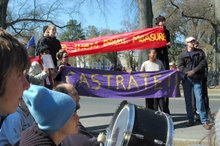





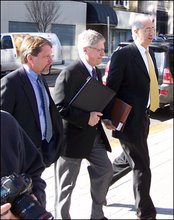
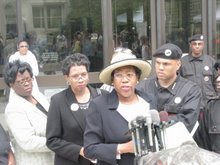
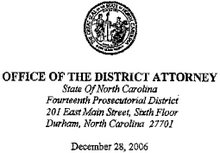
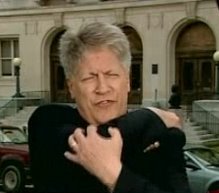





















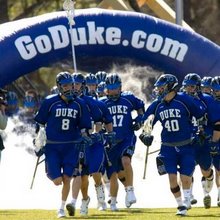







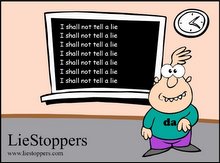






No comments:
Post a Comment